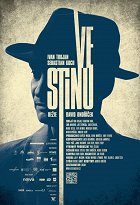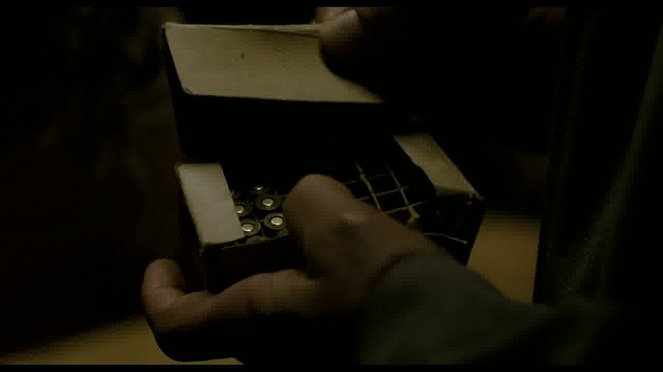Regie:
David OndříčekKamera:
Adam SikoraBesetzung:
Ivan Trojan, Sebastian Koch, Soňa Norisová, Jiří Štěpnička, Marek Taclík, Filip Antonio, Norbert Lichý, David Švehlík, Martin Myšička, Miroslav Krobot (mehr)Inhalte(1)
The movie pictures a friendship and bravery at the times when courage was a ticket to the execution ground. Framed by a criminal story, the movie takes us to the spring of 1953, shortly after the death of the communist boss Klement Gottwald. He is replaced by Antonin Zapotocky who follows the tough course of repression and strengthening the communist regime. We see Captain Hakl pass through the dusky streets in his gray overcoat. A tenacious and somewhat choleric detective full of emotion and intuition, with whiskers and a hidden pain. Hakl has been with the police for 25 years having gone through service during the First Republic, Nazi occupation and now working for the communist National security. His apoliticalness and craving for partial truth bring him across more and more new facts implying that the seemingly simple case with an only suspect starts to twist. All the circumstantial evidence are heading to the Jewish community. He is followed by Major Zenke like a shadow, who is invited from East Germany as a specialist on Jewish crime. The story deals with a fabricated mugging orchestrated by the communist secret service in order to divert attention from the impending national disaster – monetary reform. This crime committed on a nation, having gotten out of control of the initiators, is one of the greatest robberies in Europe's modern history. (Verleiher-Text)
(mehr)Kritiken (9)
I gave it four stars at first because I’m happy about every Czech film that isn’t bad, and In the Shadow is not a bad film. The problem is that it’s not the good detective film that it wants to be most of the time. It works mostly on a dramatic level, but the unnecessarily complicated, confusing and vaguely narrated level of the detective investigation bothered me in the cinema. I didn’t get exactly the who, what, how and why… Technically speaking, it’s comparable to the European competition, which is good. What Czech cinema is missing the most today are good screenwriters.
()
A detective storyline lost under a layer of ideological cleansing, and it’s not even saved by the fact that the extras are familiar faces and that Ondříček sells it visually as a sovereign European film. The cool façade is more likely to bear a jolly contemporary comedy than a period reckoning with a dark chapter of national history. A missed opportunity whose superficial glitz was only cemented by the movie award.
()
I decided to go to the cinema to see In the Shadow because I believe such efforts at good filmmaking simply deserve my money. It surprised me that David Ondříček was able to make such a great film. The actors were amazing. I have to praise Sebastian Koch, who had the desire to star in a Czech film. He definitely succeeded. Still, I must not forget Ivan Trojan in the leading role, who was absolutely amazing. But the others were good as well. And even though they only appeared in the film for a few scenes, it was a pleasure to see them, whether it was Martin Myšička, Miroslav Krobot, Simona Babčáková or Jiří Štěpnička. As for the story, I admit that I was expecting a complicated riddle with an interesting ending. But the essence is far simpler than you would expect. Nevertheless, for the great atmosphere of the fifties, the landscape and the set designs, which I still don’t understand where the filmmakers found them, and especially how they managed to adapt them so well, but also for the great production... this film simply deserves the attention.
()
In the Shadow steht hier ein erfolgreicher dunkler Thriller über eine antijüdische Verschwörung in der kommunistischen Tschechoslowakei, die im Jahre 1953 entfesselt. Ich war angenehm überrascht, wie es Ondříček gelang, die Realien zivilisiert zu bändigen - die 1950er Jahre sind nicht lediglich eine absurd dunkle Zeit, sondern sie haben auch ein Stück des "Hrabal" -Proletarismus sowie des "Wir-bauen-den-Sozialismus-Bockmists“ (großartige Rezitation des Gedichts Kulak) in sich. Es macht keinen Sinn, so zu tun, als wäre dies weiß der Gott was für eine Detektivstory - nach einer Weile ist es mir recht klar, dass es sich eher als um eine "Whodunit“-Detektivgeschichte handelt, sondern um einen heftigen Zusammenstoß zwischen dem hartnäckigen Kapitän der Kriminalpolizei mit dem "Octopus" der tschechoslowakischen sozialistischen Polizei StB handelt. Doch da kommt schon der Stolperstein: Obwohl die Schauspieler Koch und Trojan großartig spielen, im Film gut geschriebene Dialoge sind und er die Spannung aufrecht erhält, am Ende entlarvt er doch die banalsten moralischen Klischees über Heldentum angesichts der "Willkür von oben". Dies geschieht zum Preis von enormen Drehbuchwendungen und unrealistischer Lösungen (in Bezug auf die Familie, aber auch zum gesamten konstruierten Monsterprozess mit der jüdischen Gemeinde), leider auch zum Preise sehr vager Motivationen der Charaktere (es fehlt hier vollends eine Ebene, die in jedweder Weise die Tatsache angehen würde, dass sich beide Haupthelden mit sprichwörtlichen Oktopussen angelegt haben und vor allem kann Kapitän Hakl nicht so engelsrein und prinziporientiert sein kann, wie es der Film vorgibt) und am Ende führt er zu einer doofen heldenhaften Geste. Mit anderen Worten weicht hier der Realismus mitsamt des Dramas zu Gunsten einer edlen Moral über Helden zurück, die einen Aufstand wagen - so dass wir in Folge dessen anstelle eines vielschichtigen Films im Grunde genommen ein triviales Schachspiel mit Konstrukten sehen. Jammerschade, die Beschreibung der Umgebung zeigt, dass es viel mehr auf dem Spiel war. Und zum Schluss noch: Warum muss in jedem ähnlichen Film in 90% des Filmmaterials suggestive Musik erklingen? Um Gottes willen, lassen Sie das Publikum doch endlich eigenständig denken und fühlen.
()
In the Shadow has become the subject of many articles and the focus of film critics and journalists, who mostly welcomed it positively and praised it as a step back into the spotlight for Czech cinema. The same was true for Czech films like Protector or Walking Too Fast, and in all cases, I had to conclude that my view is significantly more critical and that, despite certain positives, from a global perspective, they are average films. Of those three titles, Ondříček's film seems to me to be the weakest. However, to not just criticize, I can start with the positives first. Firstly, the cast. Ivan Trojan is probably the greatest acting discovery of the post-November era and handles his detective role brilliantly. The supporting actors are also very good. Secondly, the film's budget and technical quality. It has been a long time since I have seen proper film cinematography and not a cheap TV production. The cameraman plays with light and shadows, and especially in the first fifteen minutes, it is truly a spectacle. This is also related to the attempt, albeit inconsistent, to create the retro atmosphere of the 1950s. Of course, there are also mistakes - the crew puts oil lamps in every room because it looks beautifully stylish, but as someone involved in the field, I would like to point out that Prague was already electrified during the reign of the Emperor, and oil lamps were only used in peripheral rural areas in the 1950s (full electrification was completed in 1960). However, this is obviously a detail that is not significant for most viewers. But it is worse with the screenplay, which caused me to only give it two stars. It would have been a fine film if it had been written by an American screenwriter and directed by an American director. However, this was created by Czechs, who should be steadfast in terms of our history. Moreover, it is not a light genre film, but an ambitious piece that wants to confront the past. The whole construction of the anti-Semitic conspiracy is simply too fragile and poorly conceived. The film begins as a neo-noir but quickly transitions into a psychological drama and, above all, a political thriller. This genre combination simply does not work well because, in my opinion, the film ultimately fails in all these genres. It doesn't work as a detective story at all because, to put it bluntly, the final revelation of the killer is incredibly ridiculous. As a political thriller, it is superficial and if it says anything, it's only the long-known truths. Interestingly, the most powerful films about communist crimes were made even during the functioning of real socialism. I am criticizing In the Shadow for significant logical errors that spoiled my enjoyment of the film, but unfortunately, I can't discuss them without revealing that the gardener is the murderer. Just as an example - I can't make sense of the character portrayed by Sebastian Koch in any way. What did the screenwriter mean by that? Overall impression: 45%.
()
Although Ondříček is once again working with his favorites Taclík and Trojan, his latest retro detective film does not remind us in the slightest of his older films. Which is a very good thing. Overall, the atmosphere, sets and costumes reflect the year 1953 very well. Moreover, the drama works and it is a pleasure to perceive the great acting performances of Jiří Štěpnička or Soňa Norisová next to the giant Sebastian Koch.
()
Drei und ein Stückchen. Als Detektivfilm oder Krimi ist In the Shadow ein sehr schwaches Werk mit einem sehr gewöhnlichen Plot und den schäbigsten Charakteren, die es gibt. Wenn man ihn als einen Film aus der Vergangenheit betrachtet, ist es besser. Die Stimmung kam mir glaubhaft vor und man sieht, dass sich die Filmemacher in dieser Hinsicht Mühe gegeben haben. Die "Botschaft an die Menschheit“ und "die Ehrung der Mutigen“ sind wie die Krimigeschichte – miserabel (auch wenn der Gedanke, etwas über dieses Thema zu drehen, natürlich lobenswert ist). Danke für die ausgezeichneten Schauspielleistungen von Ivan Trojan und Sebastian Koch sowie die angenehme Kamera, die fast einen Noir-Charakter hat. Für den Rest und die übertriebene Länge danke ich hingegen nicht.
()
Very solid. The atmosphere is excellent, dark and depressing, and thanks to the perfect sets, the tense 50s are literally palpable in every shot. The story unfolds like many classic crime thrillers and can't really surprise with anything, but the execution is almost flawless, from the cinematography, the aforementioned "rainy" atmosphere, the continuity of the twists and turns to the excellent performances. Ivan Trojan excels, confirming his reputation as the best Czech actor of our time, and much of the film relies on his heartfelt performance. Something similar can be said of Sebastian Koch, whose Major Zenke may not talk much, but he has charisma to spare. It's not a five-star treat, the story is still very hackneyed and lacking in emotion, but it has at least significantly restored my pride in Czech cinema after a long time. 80%
()
Actually, this could have been a very good retro detective film with stunning visuals and imaginative intermingling of music and image (Ondříček successfully followed in the traditions of Protector and Walking Too Fast, which started this "phenomenon" in Czech cinema). Nonetheless, this is a story from the 1950s, so any rationalization of the investigation is only favorable until the point when it appeals to the comrades themselves. And great praise is due to Mr. Ondříček for managing to suitably balance the share of mystery and for the fact that, when all’s said and done, this is really a "political detective thriller" that uses all of its "mystery" solely for the purpose of portraying the nervous and dark atmosphere of the 1950s as faithfully as possible.
()

